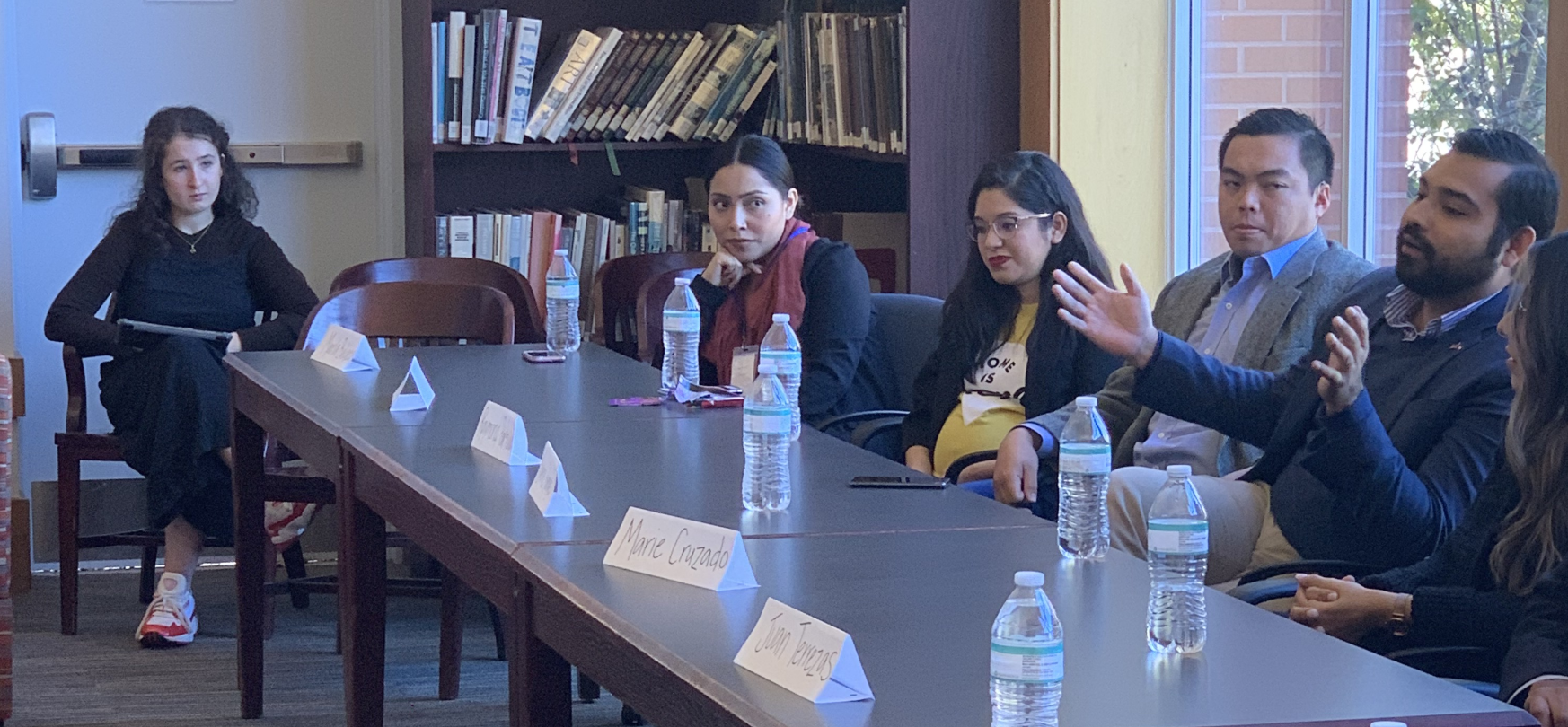This semester VOX ATL is highlighting teen activists making changes in Atlanta with our VOX Investigates: Youth Activism Revolution (#YAR) coverage. If you are a teen activist or know of any interested in having their voice heard, contact us at editor@voxatl.org.
Meet Emma Schwartz: a senior attending Paideia High School. Emma is a teen activist who became concerned about the misguided anger in our country toward immigrants following Donald Trump’s election in November 2016. Through El Refugio, Emma began to organize groups of students to visit the Stewart Detention Center (a privately owned immigration detention center in Lumpkin, GA) to visit men who wanted visitors and to teach others about immigration.
After getting a positive response from the project, Emma decided to begin the Paideia School Immigration Activism Club the following January. The club visits the detention center multiple times per year, completes service work, hosts donation drives with various organizations, engages in political advocacy through letter-writing and calling events, and works to educate others. The club is currently expanding to become Young Immigration Activists of Atlanta in order to engage in political advocacy, educate others, and help individuals on a larger scale. Emma kindly answered a few questions regarding her life as a teen activist.
VOX ATL: What injustices are you passionate about and how does your activism help to amend these issues?
Emma: I’m passionate about the issue of Immigration. I believe our work visiting the Stewart Detention Center and advocating for the people there makes the immigration process a little more humane for the individuals detained there. The last person I visited there was an asylum seeker from Africa (editor’s note: visitors of the Stewart Detention Center are not allowed to specify which country detainees are from) who was detained as soon as he got to the country. This prison was all he had seen of America. He said he was grateful we came to visit because it showed him that there were people who cared about him and that there is more to America than the prison walls surrounding him.
I also believe I’ve done a lot to raise awareness about the issue. Through Young Immigration Activists of Atlanta, I’m able to provide young people a personal connection to the issue of immigration, which enables them to be more invested than they may otherwise be.
VOX ATL: What challenges have you faced as a teen activist, and how did you beat them?
Emma: [One challenge was] dealing with the complicated dynamics of being a white girl advocating for an issue that almost entirely affects people of color. I spend a lot of time thinking about white savior narratives in pop culture and unpacking how such narratives may influence me on a subconscious level. I always try to ensure that I’m raising the voices of others through my activism rather than speaking on their behalf.
Also, in order to deal with time management issues and feeling overwhelmed, I’ve had to learn how to delegate tasks, which is something I’m just now starting to get the hang of.

VOX ATL: Do you think it’s possible for teens to make big changes in the government, and if so how?
Emma: It’s hard to say how much this translates to big changes in the government, but I certainly think teens have a lot of power over mainstream culture. I believe that if nothing else, today’s teens are doing a great job of creating a society where it’s not “cool” to be racist, sexist, homophobic, classist, Islamophobic, ableist, climate-change denying, etc. While making social justice “cool” does have an ugly side (it can enable call-out culture and give corporations motivation to engage in the capitalist commodification of social justice movements), it puts pressure on politicians to think about and address social justice concerns.
VOX ATL: What advice would you give to other teens who want to become an activist but feel scared to do so?
Emma: If the leadership aspect is what scares you, [you should know that] you don’t need to be a leader to be an effective activist. Social justice movements need people in all kinds of roles — organizers, instruction followers, artists, speakers, writers, networkers, etc. Oftentimes, we only highlight the people who take on leadership roles, and while good leaders are important, they aren’t the most important part of a movement. It is important that you not only find issues you are passionate about but also ways you can contribute that you feel you will be good at.
VOX ATL: What are some simple and accessible ways teens can participate in activism?
Emma: Stay informed. Join a club or organization. Talk about issues. Find mentors. Support businesses that are aligned with your values. Think about how activism can play a role in your future career, even if your career plans aren’t inherently social-justice oriented. For example, if you want to go into business, research social entrepreneurship. If you want to go into medicine, do research on justice-related public health topics.
Emma also wrote a piece about immigration reform for VOX ATL last semester. Read it here.
SAVE THE DATE!
VOX-a-Palooza
Sat. May 9, 2020, 1:30 pm at the Woodruff Arts Center
Come celebrate with us as we showcase the VOX Investigates: Youth Activism Revolution print edition and multimedia produced this semester. The event will also include poetry from Atlanta Word Works and teen performances from our partners at The Alliance Theater and Moving in the Spirit!





This is Emma, and I just want to note that I no longer would consider call-out-culture to be an ugly side of “making social justice ‘cool'” because it works to keep people accountable.